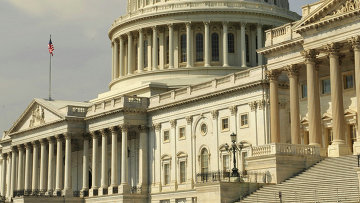WASHINGTON, December 6 - RAPSI. On Thursday, the U.S. Senate passed the Magnitsky Act, a bill imposing visa sanctions against those Russians who - in the view of the US government - have been involved in human rights violations, and simultaneously voted for the cancellation of the Jackson-Vanik amendment, a landmark Cold War-era law that has long impeded U.S.-Russian trade relations.
The House of Representatives voted 365 to 43 to approve as part of the bill a repeal of the Jackson-Vanik restrictions on trade with Russia dating back to 1974, and to bring in new rules linking trade and rights following a debate in which both Republican and Democratic lawmakers voiced firm support for the legislation.
The legislation stipulates that the U.S. government will deny visas to Russian officials suspected of involvement in the death of whistleblowing lawyer Sergei Magnitsky in a Moscow detention center three years ago, as well as freeze their assets.
The measures will allow the U.S. to take similar action against Russian officials suspected of alleged human rights violations in other cases in the future.
The version of the bill which the House of Representatives passed on November 16 was adopted to avoid further delay and has now been sent to President Barack Obama for his signature. Obama is expected to sign the bill in the next two weeks and it is expected to take effect starting in the New Year.
According to the statement of U.S. President Barack Obama, the U.S. administration will continue to support those who support democracy in Russia, The Russian Foreign Ministry has referred to the law as a "theatre of the absurd," saying that the law will negatively affect the prospects of bilateral cooperation, and the United States will be solely responsible for this.
At the same time, the ministry said that Russia does not want to renounce the positive outcomes in Russia-U.S. relations that have been achieved in the past few years.
Russian Foreign Minister Sergei Lavrov said earlier that Russia will close entry to citizens of this country that violates human rights in response to the adoption of bill on "Magnitsky list."
Hermitage Capital counselor Sergei Magnitsky accused law enforcement officials in 2008 of a $230 million tax fraud.
Shortly after coming forward with these accusations, Magnitsky was arrested on charges of having masterminded large-scale corporate tax evasion. According to investigators, Magnitsky and his accomplices stole hundreds of millions of rubles from the state by manipulating tax returns between September and October 2007.
The attorney died in a Moscow pretrial detention center on November 16, 2009 after spending a year behind bars. According to the Prosecutor Generals Office, his death was caused by cardiovascular insufficiency. Magnitsky's death sparked a public outcry and triggered amendments to the Criminal Code and a reshuffling of officials in the penal system.
In addition to the Magnitsky component, the legislation passed simultaneously cancels the Cold War-era Jackson-Vanick amendment-which was aimed at holding the Soviet Union, among other nations, accountable for their human rights record-and establishes permanent normal trade relations (PNTR) with Russia.
After Russia's accession to the World Trade Organization (WTO) in August, Washington needs to enact PNTR with Moscow in order to afford US producers the maximum economic benefit of operating on the Russian market.
A broad consensus has formed on the PNTR issue among US officials, businesses and industry lobbies, who say the US economy stands to benefit greatly from opening up the Russian market to American entrepreneurs.
The White House, however, had sought to keep the issues of PNTR and the repeal of Jackson-Vanick separate from the Magnitsky bill-a position widely seen as an attempt to prevent the Magnitsky legislation from negatively impacting US-Russian cooperation on issues such as counterterrorism and arms reduction.



